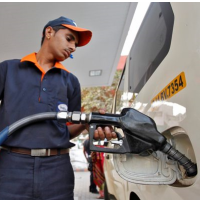Reform 06: Diesel Prices Deregulated Finally
 Cheaper global prices were the key factor in the government’s decision
Cheaper global prices were the key factor in the government’s decision
The government has lifted state control on diesel prices, in a long-awaited move that economists say will help encourage investment in the country’s struggling fuel industry and reduce the fiscal deficit. The decision to allow state-run fuel retailers to peg the price of diesel to global market rates comes as Prime Minister Narendra Modi seeks to streamline the bureaucracy and make the economy more attractive to international investors.
“Henceforth – like petrol – the price of diesel will be linked to the market,” Finance Minister Arun Jaitley told the media after a cabinet meeting on Saturday . “Whatever the cost involved, that is what consumer will have to pay.”
India ended government control of petrol prices in 2010, but diesel prices at state-run fuel retailers that dominate the market were only allowed to shift occasionally with previous government approval. The pricing of cooking gas and kerosene will remain under government control.
While the new fuel pricing policy will now expose Indian consumers to global fluctuations, the move was welcomed as the recent slide in global prices means that diesel prices were cut by 5.7 per cent in New Delhi to Rs. 55.60 ($0.93).
Diesel prices had so far been raised by a cumulative Rs. 11.81 since January 2013, making this the first price cut in over 5 years. The cheaper global prices of crude oil were the key factor in the government’s decision to bite the bullet of deregulation.
After all, in the year ended in March, the government’s fuel subsidy bill was around Rs. 700 billion ($11 billion), half of which was for diesel. Before diesel prices were freed, it was estimated that a $1 per barrel rise in the global price of oil increased India’s subsidy bill by $1 billion a year.
L.K Gupta, chief executive at Essar Oil, said, “This (deregulation of diesel prices) will not only help in controlling the fiscal deficit, but also be advantageous for the consumers,” as it will lead to lower prices and open up the industry to more private-sector fuel retailers. “This will also leave more money with upstream companies for investment,” he added.
According to the finance minister, the cabinet also decided to raise prices of locally produced natural gas to $5.61 per million metric British thermal unit from $4.20, a move that could make it more attractive for companies to invest in the exploration and production of natural gas in India.
The new natural gas prices will be effective from November 1 and will be revised every six months. A decision to raise local natural gas prices had been deferred twice in the past as it was considered politically unpalatable.
While companies looking to find and produce natural gas reserves in India wanted higher prices as an incentive to keep drilling, this had been opposed by industries that use natural gas, such as power and fertilizer.
“The two bold decisions show that Modi is serious about reforms,” Saurabh Vyas, co-founder of consultancy PoliticalEdge, told The Wall Street Journal. “Now let’s see if the reforms attract more and more investment in the sector or not.”
To Learn More:
India ends diesel controls, raises gas prices (by Nidhi Verma, Reuters)
Modi to axe India’s diesel subsidies (by James Crabtree, The Financial Times)
Government on reforms yatra, begins by deregulating diesel price (Mail Today)
India Frees Diesel Prices From Government Control (by Saurabh Chaturvedi and Prasanta Sahu, The Wall Street Journal)
- Top Stories
- Controversies
- Where is the Money Going?
- India and the World
- Appointments and Resignations
- Unusual News
- Latest News
- India College Chain’s Expansion into U.S. Draws Opposition from Massachusetts Officials over Quality of Education
- Milk Shortages in India Tied to Release of New Movies Featuring Nation’s Favorite Stars
- Confusion Swirls around Kashmir Newspaper Ban in Wake of Violent Street Protests
- Polio-Free for 5 Years, India Launches Vaccine Drive after Polio Strain Discovery
- New Aviation Policy Could Increase Service, Lower Ticket Prices






Comments